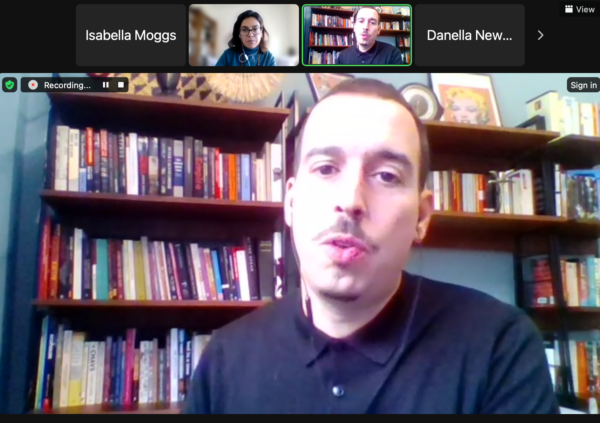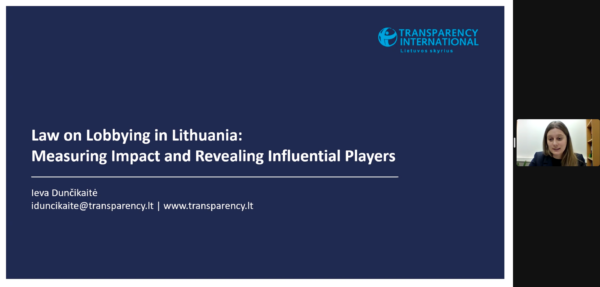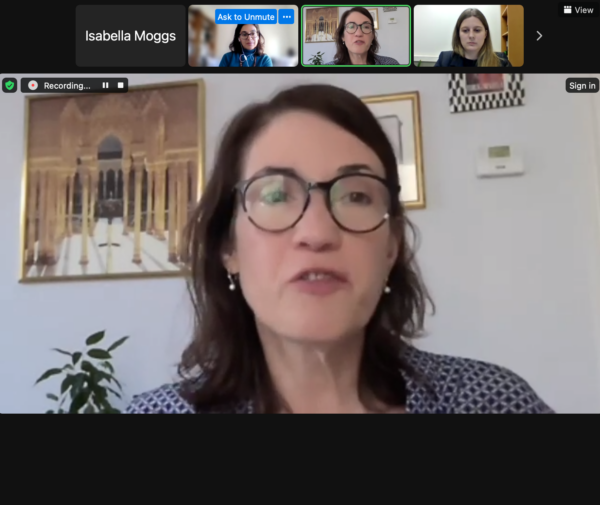4 December 2023 –
There is a paradox associated with lobbying. While it has become commonly accepted that lobbying is an inherent and legitimate activity in our increasingly complex democratic societies, including the lobbying carried out by civil society groups, citizens are concerned about corporate lobbying practices that lead to excessive influence or open the door to corruption. In the 10th and last regional meeting of the year, held on November 23, the UNCAC Coalition Europe network discussed the status of lobbying regulations across Europe and its associated risks, and outlined paths for higher integrity and fairness in decision-making. We looked at how shedding light on lobbying can contribute to mitigating corruption risks and policy capture.
A fine line between lobbying and undue influence
Transparency International defines the activity of lobbying or interest group influence as “any direct or indirect communication with public officials, political decision-makers or representatives for the purposes of influencing public decision-making carried out by or on behalf of any organized group”. We cannot imagine today that legislators and policy-makers elaborate norms and policies without external input. On the contrary, the more they take into account expertise and insights from those who will be affected by regulations, the better they can design laws and policies that correspond to citizens’ needs.
However, uncontrolled lobbying carries risks of undue influence, when corruption-related offenses defined by the United Nations Convention against corruption (UNCAC), such as bribery (articles 15 and 16) or trading in influence (article 18), are used to buy political decisions. Undue influence also goes beyond established offenses and can occur when groups with the most resources and power exert a disproportionate influence over public policies. Such influence may be legal, but leads to undesirable social outcomes if it diverts public decisions over policies away from the public interest towards narrow, vested interests. This phenomenon, known as policy capture, can exacerbate inequalities and undermine democratic values and trust in government.
To counter these risks, governments have increasingly attempted to regulate lobbying. Since the OECD issued the first set of international guidelines in its Recommendation on Principles for Transparency and Integrity in Lobbying in 2010, an exponential number of countries have adopted and updated lobbying definitions and regulations. Governments have engaged in enhancing transparency, integrity and equal access to policy-makers at varying speeds and with different focus; while some have emphasized public scrutiny, others have relied on the integrity culture of their public officials or on self-regulation of private actors.
However, in the European context, considerable gaps remain in effectively safeguarding integrity and fairness in public decision-making. Last year, the Council of Europe’s Group of States against Corruption (GRECO) urged European governments to increase transparency and accountability around lobbying to reduce the risk of corrupt practices. In the words of GRECO’s president: “Public confidence has been tested to the limit in some cases in recent times as corruption scandals regularly emerge in the media. The public has a right to know who is influencing political decisions. Gaining access to this kind of information should be simple and quick.”
Given the flaws of the Transparency Register and shortcomings in the EU integrity framework, and the so-called Qatargate scandal which shook the European Parliament at the end of 2022 in a case of alleged influence-buying, in September 2023, Members of the European Parliament (MEPs) overwhelmingly voted in favor of strengthening their own rules. The changes came into force last month, and include the obligation for MEPs to disclose more information about their meetings with interest representatives, including ideas or suggestions received, harsher penalties for breaches of the code of conduct and stronger rules on ‘revolving doors’. They also agreed to expand the definition of lobbying and increase control over conflicts of interest, gifts and travel costs, and to have MEPs declare their other remunerated activities with greater detail.
Civil society efforts to bring about effective lobbying regulation in Greece
Several specialized civil society organizations have been very active in the past decade in exposing unethical or improper influences while demanding strong and effective lobbying regulations. An example of this are the International Standards for Lobbying Regulation, published in 2015 as a result of a two-year collaborative work. To expose concrete initiatives at the national level, Stefanos Loukopoulos, Co-founder and Director of the Greek not-for-profit watchdog Vouliwatch, kicked off the round of presentations and explained his organization’s attempts to influence lobbying regulation in Greece. The case illustrated the battery of techniques a civil society organization can deploy from research and evidence-based advocacy to informal contacts.
Vouliwatch was one of the first organizations in Greece to campaign for lobbying regulation. About three years ago, they started conducting advocacy activities, called for a commitment on lobbying to be incorporated into the country’s Open Government Partnership national action plan, published and widely disseminated a policy paper with a set of specific recommendations envisaging what the Greek regulatory framework should ideally look like. Their recommendations were based on a comparative analysis on lobbying regulations globally and best international practices. Eventually, their work brought the issue of lobbying regulation to the forefront of the Greek political agenda, although this was not explicitly acknowledged by the government.

When the Minister of Interior announced the plan to introduce a lobbying regulation, Vouliwatch requested a meeting to present their policy paper. Although they were not formally consulted during the drafting process, they were able to obtain the draft bill. Once the bill entered parliamentary negotiations, Vouliwatch continued to meet with deputies from opposition parties who welcomed their proposals and invited the organization to speak at the corresponding parliamentary committee to convey their concerns and recommendations.
Greece adopted the first lobbying regulation in September 2021. Whilst some of their recommendations were taken into account, the law was largely disappointing for Vouliwatch. For instance, it obliges lobbyists to declare the purpose and result of their activity, and parliamentarians to register meetings with lobbyists. However, a lobbyist is defined in very narrow terms: the law covers only professionals from lobby firms, thereby excluding companies’ in-house lobbyists who, according to Stefanos, are the majority. A Transparency Registry was created by the law and finally set up in the spring of 2023, but key information is only published once a year, impeding real transparency. Overall, the lobbying regulatory framework is weak and ineffective, as reflected by the low number of registrations in the transparency registry. Vouliwatch continues to advocate for transparency in lobbying and a positive development is they have been invited to participate in drafting the code of conduct for lobbyists.
Measuring the impact of the Lithuanian law on lobbying and revealing influential players
Lithuania adopted a new law on lobbying in 2021, yet the starting point was very different from Greece’s. Ieva Dunčikaitė, Project Leader from Transparency International Lithuania (TI Lithuania), presented their role on the path leading to the new law and provided initial insights on how it is being implemented. Lithuania is one of few countries in Europe with lobbying legislation since 2001, but it was insufficient and only captured a small share of influence in practice. In 2020, the register included approximately 100 lobbyists, leaving many de facto lobbyists off record due to a narrow definition of lobbying that only considered physical persons. Another issue to tackle was the cultural perception of lobbying as a negative activity, which made politicians avoid acknowledging that they actually met with lobbyists. Without information, the myth that politicians do not meet with interest groups persisted.

TI Lithuania started to challenge the status quo of lobbying regulation by looking for data and cross-referencing different data sources. They launched regular surveys including a question about how open public decision-making is in Lithuania. For a long time, the common perception did not match reality, as half of respondents saw it as a closed process. To obtain data on the extent of lobbying activities, the organization also submitted information requests about the number and types of permits to enter the Parliament. The outcome of this showed that close to 5,000 interest groups had been influencing legislation. Furthermore, they could confirm that Members of Parliament were holding meetings with different interest groups by checking the public agendas of those who published them – about half of parliamentarians. All information fed the dedicated website My Parliament, created in 2016 as part of Transparency International’s project Integrity Watch.
Eventually, TI Lithuania’s work triggered the data-driven, public conversation that was previously missing about transparency in politics, and sparked changes. Taking distance from the original premise that lobbying is negative, they advocated for the idea that “a good politician is an active one [who meets many different interest groups] but also a transparent one”. They fostered competition for transparency among political groups and obtained commitments at different levels. The Lithuanian Parliament raised the quality and openness of their data, becoming one of the most transparent Parliaments in the world according to TI Lithuania, and improvements in accountability are now visible at the municipal level.
Concerning the legal framework, the Law on Lobbying Activities was amended in 2021. For the first time ever, it introduced a cross-declaration where both lobbyists and politicians / public servants have to report on their meetings. In addition, under the new law not only physical persons but also legal entities can register as lobbyists. TI Lithuania’s work continuously contributes to the debate about lobbying through thorough data analysis. Their first report about the implementation of the law on lobbying, presented two weeks ago, concluded that numbers of registered lobbyists and of transparency declarations have been multiplied respectively by three and by four, from 2021 to 2023. They also detected a mismatch between declarations filed by lobbyists and politicians, and could identify the most common forms of illegal acts and which sectorial legislations are lobbied the most.
Lobbying for transparency of lobbying: Challenges in Europe
The Executive Director of Access Info Europe, Helen Darbishire, closed the round of presentations with an overview of lobbying regulation and challenges in the European Union (EU), and brought some observations for a nuanced conversation about lobbying, corruption and participation. For her, the very perception of lobbying in civil society discourse needs to change: while we call for lobbying transparency to combat corruption, most lobbying is the legitimate representation of communities or of legitimate business activities. It is therefore important to make a clear distinction between corruption and lobbying, which is genuinely part of civic participation in political life.

Recalling Transparency International’s definition of lobbying, she highlighted that regulation should be about the activity itself, not about who is partaking in it. However, EU-level regulation focuses on the Transparency Register and requires that those engaging in lobbying with the European Commission, the Parliament and the Council of the EU register in it. Most registrations come from the business sector, including companies and membership associations, while just one quarter constitute civil society organizations (CSOs). The latter are likely to spend much less on lobbying than big companies; yet, there is a lack of data on lobby expenditure and, in general, a lack of real-time information and open data on lobbying activities in Europe to enable public oversight, as concluded by the 2022 Global Data Barometer.
Obtaining data on lobbying activities should be a priority to be able to monitor its influence on decision-making. Civil society organizations could contribute by collecting lobbying data in countries across Europe, and advocate for the EU to require a minimum standard of lobbying transparency in its Member States. Helen argued that responsibility to collect and publish the information should be largely placed on the public bodies who are lobbied and who are ultimately responsible for the decision-making. Those responsible should not be just the Members of Parliament, since early on decisions are made at the executive and the public administration levels before legislative proposals reach Parliament. In this sense, what is needed is an opening up of participation activities at all stages of public decision-making. Chiming in with the previous speakers, Helen acknowledged that lobbying transparency and other contacts of policy-makers with influence groups helps reduce the space in which corruption can happen. But at the same time, transparency in many other areas needs to increase, such as on assets declarations, conflict of interest declarations, expenses of public officials – issues that Access Info Europe has been working on for a long time through analysis and recommendations.
Building standards to enhance transparency in decision-making
What systems and regulations contribute to legal and legitimate lobbying? Should countries look up to the European Union or to the national level for best practice examples? Is a bad law on lobbying better than no law at all? These were some of the thought-provoking questions that arose in the discussion with the rest of participants. We also highlighted the importance of aiming for the transparency of decision-making and increasing participation opportunities for civil society, beyond lobbying.
Commenting on Portugal’s current political scandal related to suspicion of corruption and trading in influence, a participant wondered whether, in such a case, lobbying regulations would not have worked preventively or would have made lawyers of defendants claim ex post that activities under consideration were in fact (legal) lobbying practices instead of (illegal) trading in influence. Another participant responded that legislation on lobbying or a lobby register does not interfere as it does not exempt a lobbyist from eventually being accused of bribery or any other illegal practice to try to influence policy.
On what could be good examples of lobbying regulation, it was noted that European Union institutions function in a different reality than the Member States, especially on issues such as political finance or lobbying. Some countries that have inspired others on lobbying regulation are Ireland and Canada.
Finally, several participants agreed on the fact that having a bad law is preferable to awaiting the perfect law. In the example of Greece, the biggest step was to convince the government that lobbying should be regulated in the first place. Now there is an imperfect law to build on, including by working with the opposition parties ahead of elections. Pre-existing legislation was also what enabled Lithuanian civil society to obtain some initial data and push for improvements in the legal framework. In this sense, a bad law is at least a step towards a better law, as it can trigger a social conversation, which might eventually translate into putting the topic on the political agenda and legal changes.
A comparison was drawn between the evolution of access to information laws and how civil society organizations’ clear standards about what should be included in an access to information law. Their work led to the current situation in which every country, part of the Council of Europe has an Access to Information Law, and the Council of Europe Convention on Access to Official Documents (known as Tromsø Convention) has been ratified by an increasing number of States. Similar work could be undertaken concerning lobbying regulations to develop a core framework of what should be in a “law on lobbying” based not only on recommendations from intergovernmental bodies such as the OECD, but also on existing best practices.
_____________________________________________
Further resources:
See Transparency International EU recent reports on lobbying and political integrity:
“Who has been lobbying the European Commission? A look at meetings since von der Leyen took over” (July 2022): https://transparency.eu/who-has-been-lobbying-the-european-commission/
Series of integrity systems’ studies published in 2021 on transparency and integrity measures in place with a detailed section on lobbying for the Parliament, Commission and Council.
Deep Pockets, Open Doors : Big tech lobbying in Brussels (2021): https://transparency.eu/deep-pockets-open-doors/
_____________________________________________



